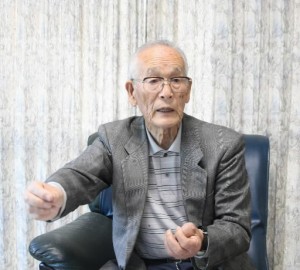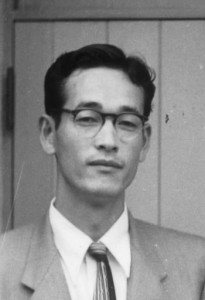Takao Inoue, 89, Fukuyama City
Feb. 12, 2016
Gave remains of other soldiers to their families
by Rie Nii, Staff Writer
During World War II, Takao Inoue, now 89, was a communications soldier in the Chugoku Military District Communications Reserve (the so-called Chugoku 121 Corps), which was located on the grounds of Hiroshima Castle, about 600 meters from the hypocenter of the atomic bomb. Most of the roughly 1,000 soldiers in this unit were killed in the blast. Seven soldiers, including Mr. Inoue, managed to escape death because they were performing duties in a different place. In the aftermath of the bombing, they were involved in returning the remains of soldiers to family members who had come to find them. Recalling his experience, Mr. Inoue said, “We gave them remains from where it seemed the victims had been. The families were grateful to us and went back home with these remains.”
Back then, Mr. Inoue was 18 years old. He had been drafted into the military from the Kure Post Office located in the city of Kure. The day before the atomic bomb was dropped, seven people, including Mr. Inoue, went to the Chugoku Military District Communications Reserve located in Hakushimakita-machi (now part of Naka Ward, about 2 kilometers from the hypocenter) to install telephone lines. But they could not finish their work that day and they stayed at that location.
At 8:15 a.m. on August 6, 1945, Mr. Inoue was about to load telecommunications equipment into a vehicle to begin the work day when there was a blinding light then a tremendous boom. The sky turned an orange-tinged yellow and he could see nothing in the murk that fell around him.
When the air cleared, he found that their wooden, two-story barracks had been completely destroyed by the blast. He then heard cries for help, but because this was a time when military equipment was a higher priority than people’s lives, Mr. Inoue and his fellow soldiers sought to return to the military headquarters on the grounds of Hiroshima Castle to move their equipment to a safe place.
They ventured to the railway tracks of the Sanyo Line (managed by the former Japan National Railway), but were unable to go on from there because of raging flames. Among the people fleeing from the city center, there were some whose arms and legs were dangling from broken bones, others who became blind from their blistered faces or suffered burns that peeled the skin from their bodies, and a mother who clutched her dead baby. The group of seven soldiers that included Mr. Inoue became engaged in rescue operations, guiding A-bomb survivors to the banks of the Kyobashi River and shady parts of the hilly Ushita district (now part of Higashi Ward) and clearing paths for the survivors to follow. The fires died out four or five days after the atomic bombing, and they finally returned to the military headquarters.
The site where the corps was located had been turned into burnt ruins. “Only stones, steel frames, and human remains were left,” Mr. Inoue said. “Those wouldn’t burn.” The seven soldiers wrote a message in coal on the stone gate of the corps that they would be at Hatsukaichi National School (now Hatsukaichi Elementary School), then each day they went back and forth from the school to the former site of the corps.
They gave the remains of other soldiers to family members who came to search for them. Guided by an army register that had been dug out of an underground shelter, they took family members to the former site of the barracks, where soldiers seemed to have been, and let them take those remains home. Mr. Inoue was thanked by family members of the dead, who told him, “Thank you so much for telling us where their remains could be found.”
After the war, Mr. Inoue traveled by train to Okayama and Kurashiki, taking with him the remains of five more soldiers to give to the families who had not yet come to receive them.
Mr. Inoue’s father, Kakugoro, then 52, came to Hiroshima in search of his son. Five or six days after the atomic bombing, Kakugoro left home in Fukuyama and traveled to Kaitaichi Station (now part of Kaita-cho) by train, then walked to Hiroshima Castle. Seeing the message on the stone gate, he went on to Hatsukaichi National School. “He was elated to find me alive,” said Mr. Inoue, his eyes wet with tears.
Soon after leaving military service in 1946, he resumed his work at the Kure Post Office. After that, he worked for a telephone company in various places in Hiroshima Prefecture. After getting married in 1953, he began growing chrysanthemums after attending a chrysanthemum show. He has received the Prime Minister’s Award and the Prefectural Governor’s Award many times for his chrysanthemums, and he exhibits them at the chrysanthemum show in Fukuyama every year.
“I’ve made many friends by giving out seedlings. The circle of people continues to grow and there are smiles all around because of chrysanthemums,” Mr. Inoue said. “All countries should help one another in times of trouble and build peace through mutual support. Never wage war again!”
Teenagers’ Impressions
Not easy to stay calm and aid survivors
Mr. Inoue helped A-bomb survivors by guiding them to shady spots for several days after the atomic bombing. The things he witnessed were terrible: people’s eyeballs popped from their sockets, their burned skin hanging from their bodies. It can’t be easy to stay calm under such circumstances and continue to help people. If I ever encounter a disaster, accident, or act of terrorism, I hope I can take action like he did. (Takeshi Iwata, 17)
When the military was a higher priority than human life
Mr. Inoue said that, during the war, protecting military equipment was more important than people’s lives. It really struck me when he said that they had to move their equipment to a safe place before they could help the people around them. I want to continue trying to understand the reality of things beyond what the government and media tells us so another time of following such terrible orders will never arrive.” (Shiori Niitani, 17)
War can be eliminated by building trust
Again and again, Mr. Inoue said that we have to rely on one another. Even before the atomic bombing, he said that he had shared some of his rationed food with others, hoping that the war would soon come to an end. I think war can be eliminated if countries help one another and build trust between them, even in these current conditions. (Mei Morimoto, 17)
(Originally published on February 1, 2016)










